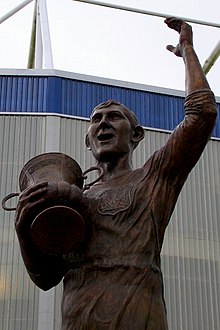 Statue of Keenor outside the Cardiff City Stadium | |||
| Personal information | |||
|---|---|---|---|
| Full name | Frederick Charles Keenor | ||
| Date of birth | 31 July 1894 | ||
| Place of birth | Cardiff, Wales | ||
| Date of death | 19 October 1972 (aged 78) | ||
| Place of death | Cardiff, Wales | ||
| Height | 5 ft 7 in (1.70 m)[1] | ||
| Position(s) | Defender | ||
| Senior career* | |||
| Years | Team | Apps | (Gls) |
| 1912–1931 | Cardiff City | 432 | (17) |
| 1915–1919 | → Brentford (war guest) | 46 | (5) |
| 1931–1934 | Crewe Alexandra | 116 | (5) |
| 1934–1935 | Oswestry Town | ||
| 1935–1937 | Tunbridge Wells Rangers | ||
| International career | |||
| 1920–1932 | Wales | 32 | (2) |
| Managerial career | |||
| 1934–1935 | Oswestry Town | ||
| 1935–1937 | Tunbridge Wells Rangers | ||
| *Club domestic league appearances and goals | |||
Frederick Charles Keenor (31 July 1894 – 19 October 1972) was a Welsh professional footballer. He began his career at his hometown side Cardiff City after impressing the club's coaching staff in a trial match in 1912 organised by his former schoolteacher. A hard tackling defender, he appeared sporadically for the team in the Southern Football League before his spell at the club was interrupted by the outbreak of the First World War. Keenor served in the 17th (Service) Battalion, Middlesex Regiment, led by Major Frank Buckley, which became known as the Football Battalion. He fought in the Battle of the Somme, suffering a severe shrapnel wound to his thigh in 1916. He returned to Britain and after a lengthy rehabilitation he ended the war as a physical training instructor, reaching the rank of sergeant. He also appeared as a guest player for Brentford during the war.
Overcoming doubts about the possibility of playing again, Keenor returned to the game with Cardiff as they embarked on the most successful period in their history. They won promotion to the First Division one season after joining the Football League in 1920. Keenor helped the club to the 1925 FA Cup Final, in which Cardiff suffered a 1–0 defeat to Sheffield United. In 1926, he replaced the departing Jimmy Blair as club captain, leading the team to success in the 1927 FA Cup Final later in the season, in which they defeated Arsenal 1–0. Their triumph remains the only time the competition has been won by a team based outside England.
Keenor was released by Cardiff at the end of the 1930–31 season, which saw the club relegated to the Third Division South. During his time at Cardiff, he made more than 500 appearances for the club, winning four Welsh Cup titles, the FA Cup and the FA Charity Shield in a 19-year association with the side. He is regarded as one of the club's all-time greats. A statue of Keenor, lifting the FA Cup, was erected outside Cardiff's new ground, the Cardiff City Stadium, in November 2012 following a public fundraising campaign.
Keenor finished his career with spells at Crewe Alexandra, Oswestry Town and Tunbridge Wells Rangers. During his career, he also attained 32 caps for the Wales national football team. He helped the side win the British Home Championship three times, in 1920, 1924 and 1928, and captained the side on numerous occasions, scoring two goals. Following his death in 1972, the Football Association of Wales secretary Trevor Morris commented, "Fred Keenor will go down as one of the greatest players and greatest characters ever produced by Wales".[2]
- ^ Cite error: The named reference
J107was invoked but never defined (see the help page). - ^ Leighton 2010, p. 158